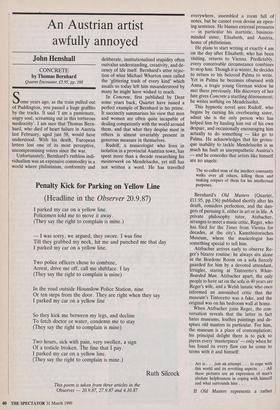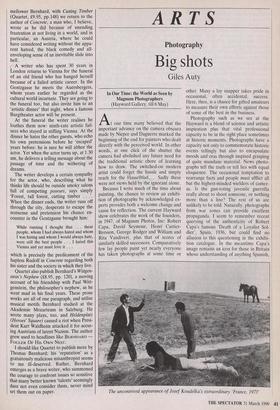An Austrian artist awfully annoyed
John Henshall
CONCRETE by Thomas Bernhard
Quartet Encounter, £5.95, pp. 168
Some years ago, as the train pulled out of Paddington, you passed a huge graffito by the tracks. It said 'I am a passionate, angry soul, screaming out in this torturous mediocrity'. I am sure that Thomas Bern- hard, who died of heart failure in Austria last February, aged just 58, would have understood. With his death, European letters lost one of its most perceptive, uncompromising voices since the war.
Unfortunately, Bernhard's ruthless indi- vidualism was an expensive commodity in a world where philistinism, conformity and deliberate, institutionalised stupidity often outvalue understanding, creativity, and de- cency of life itself. Bemhard's utter rejec- tion of what Michael Wharton once called the 'glittering trash of every kind' which assails us today left him misunderstood by many he might have wished to reach.
In Concrete, first published by Dent some years back, Quartet have issued a perfect example of Bernhard in his prime. It succinctly summarises his view that men and women are often quite incapable of dealing competently with the world around them, and that what they despise most in others is almost invariably present in generous measure in themselves.
Rudolf, a musicologist who lives in isolation in a provincial Austrian town, has spent more than a decade researching his meisterwerk on Mendelssohn, yet still has not written a word. He has travelled everywhere, assembled a room full of notes, but he cannot even devise an open- ing sentence. He blames external pressures — in particular his inartistic, business- minded sister, Elisabeth, and Austria, home of philistinism.
He plans to start writing at exactly 4 am on the day after Elisabeth, who has been visiting, returns to Vienna. Predictably, every conceivable circumstance combines to stop him. Though it is winter, he decides to return to his beloved Palma to write. Yet in Palma he becomes obsessed with Anna, a tragic young German widow he met there previously. His discovery of her fate gives Concrete a startling denouement; he writes nothing on Mendelssohn.
This hypnotic novel sees Rudolf, who begins by cursing his overbearing sister, admit she is the only person who has helped him by hauling him out of his own despair, and occasionally encouraging him actually to do something — like go to Palma. He acknowledges that his grotes- que inability to tackle Mendelssohn is as much his fault as unsympathetic Austria's — and he concedes that artists like himself are no angels:
The so-called man of the intellect constantly walks over all others, killing them and making corpses of them for his intellectual purposes.
Bernhard's Old Masters (Quartet, £11.95, pp.156) published shortly after his death, considers perfection, and the dan- gers of pursuing it, either in art or in life. A private philosophy tutor, Atzbacher, arranges to meet a music critic, Reger, who has filed for the Times from Vienna for decades, at the city's Kunsthistorisches Museum, where the musicologist has something special to tell him.
Atzbacher arrives early to observe Re- ger's bizarre routine: he always sits alone in the Bordone Room on a sofa fiercely guarded for him by a devoted attendant, Irrsigler, staring at Tintoretto's White- Bearded Man. Atzbacher apart, the only people to have sat on the sofa in 40 years are Reger's wife, and a Welsh lunatic who once informed an astonished critic that the museum's Tintoretto was a fake, and the original was on his bedroom wall at home.
When Atzbacher joins Reger, the con- versation reveals that the latter in fact hates museums, loathes paintings and de- spises old masters in particular. For him, the museum is a place of contemplation; his principal delight there is to pick to pieces every 'masterpiece' — only when he has found its every flaw can he come to terms with it and himself:
Art is . . just an attempt . . . to cope with this world and its revolting aspects . . . All these pictures are an expression of man's abolute helplessness in coping with himself and what surrounds him . . .
If Old Masters represents a rather mellower Bernhard, with Cutting Timber (Quartet, £9.95, pp.148) we return to the author of Concrete, a man who, I believe, wrote as he did because of unending frustration at not living in a world, and in particular, an Austria, where he could have considered writing without the appa- rent hatred, the black comedy and all- enveloping sense of an inevitable slide into hell.
c A writer who has spent 30 years in London returns to Vienna for the funeral of an old friend who has hanged herself because of a failed artistic career. In the Gentzgasse he meets the Auersbergers, whom years earlier he regarded as the cultural world incarnate. They are going to the funeral too, but also invite him to an `artistic dinner' that night, when a famous Burgtheater actor will be present.
At the funeral the writer realises he loathes them now: ninth-rate artistic fail- ures who stayed in stifling Vienna. At the dinner he hates the other guests, who echo his own pretensions before he 'escaped' years before: he is sure he will abhor the actor. Yet when the actor turns up, at 1.30 am, he delivers a telling message about the passage of time and the withering of dreams.
The writer develops a certain sympathy for the actor, who, describing what he thinks life should be outside smoky salons full of competing poseurs, says simply `Forest, tall forest, cutting timber .
When the dinner ends, the writer runs off through the city, desperate to escape the nonsense and pretension his chance en- counter in the Gentzgasse brought him:
While running I thought that . . . these people, whom I had always hated and whom I was hating and whom I would always hate, were still the best people . . I hated this Vienna and yet must love it . . .
which is precisely the predicament of the hapless Rudolf in Concrete regarding both his sister and the society in which they live.
Quartet also publish Bernhard's Wittgen- stein's Nephew (£8.95, pp. 120), a moving account of his friendship with Paul Witt- genstein, the philosopher's nephew, as he went mad in his final years. These prose works are all of one paragraph, and utilise musical motifs Bernhard studied at the Akademie Mozarteum in Salzburg. He wrote many plays, too, and Heldenplatz (Heroes' Square) caused a riot when Presi- dent Kurt Waldheim attacked it for accus- ing Austrians of latent Nazism. The author grew used to headlines like BERNHARD FOULER OF HIS OWN NEST.
I should like Quartet to publish more by Thomas Bernhard; his 'reputation' as a gratuitously malicious misanthropist seems to me ill-deserved. Rather, Bernhard emerges as a brave writer, who summoned the courage to confront issues so sensitive that many better known 'talents' seemingly dare not even consider them, never mind set them out on paper.



























































 Previous page
Previous page